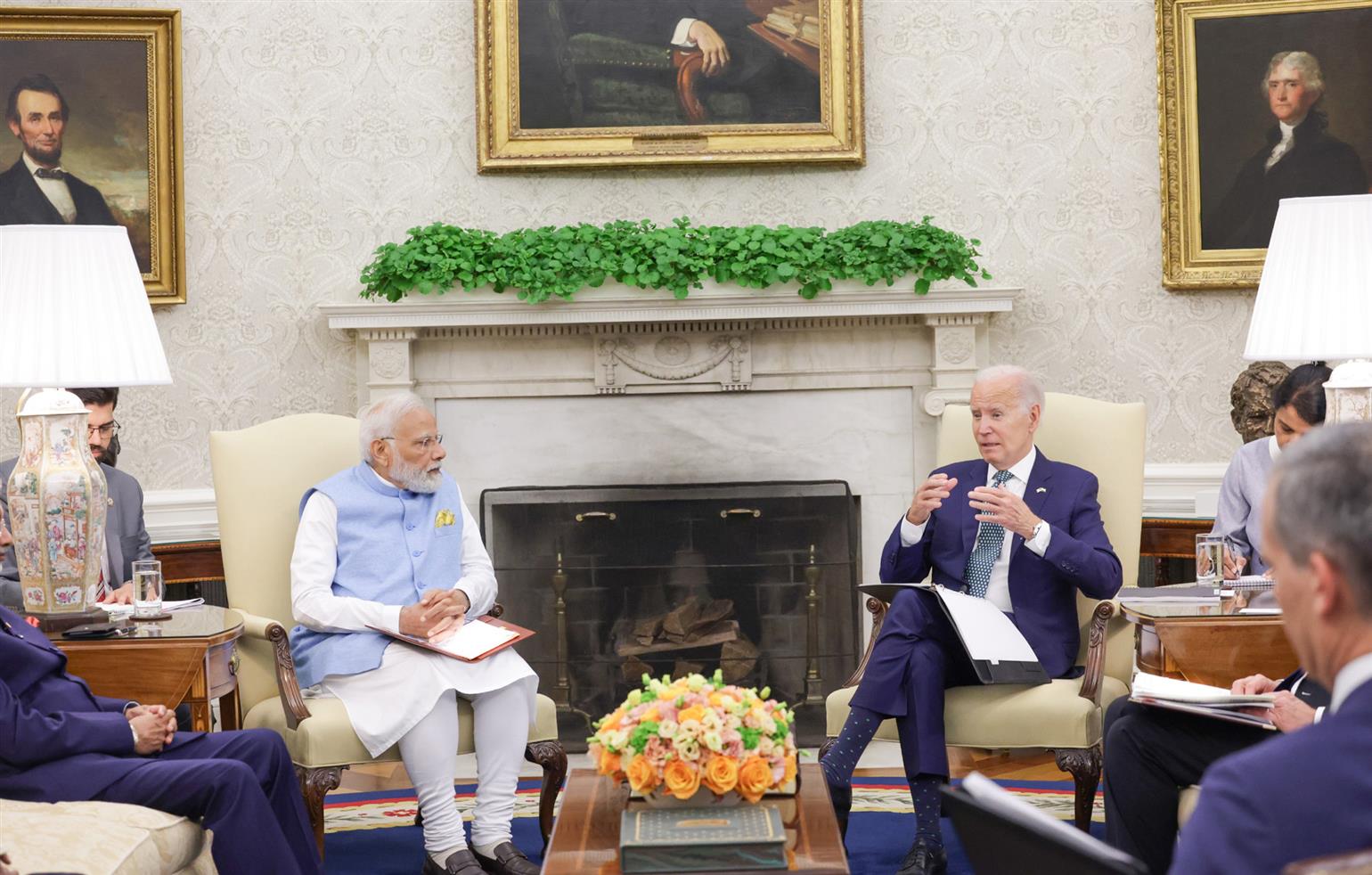
Prime Minister Narendra Modi with the President of USA, Joe Biden at White House, in Washington DC, today.
Washington: As Indian Prime Minister Narendra Modi began his State visit by attending a private engagement hosted by the President and First Lady of the USA in the White House, the US administration played down a letter by 57 Congressmen and 18 Senators about the alleged human rights violation by the Modi government in India.
“…we have talked about human rights at the nexus of a number of countries around the world. We’ve done so clearly…And as we do with other nations around the world, we regularly engage at the senior levels on our human rights concerns, including freedom of religion and freedom of belief. Our view is that a secure, prosperous, and democratic and pluralistic India is a natural partner for the United States and that I am sure is something our Indian partners view as well,” Vedant Patel, Principal Deputy Spokesperson of the US State Department, told a press conference.
The letter dated June 20, 2023, written on the letterhead of the Congress of the United States and addressed to Joe Biden had urged the US President to raise ‘directly’ with Prime Minister Modi the “areas of concerns” such as the “shrinking of political space, the rise of religious intolerance, the targeting of civil society organizations and journalists, and growing restrictions on press freedoms and internet access”. The letter specifically mentioned the State Department’s 2022 Country Report on Human Rights Practices in India “documents the tightening of political rights and expression. It also referred to the State Department’s 2022 Report on International Religious Freedom in India which “details the worrisome increase of religious intolerance toward minorities and religiously motivated violence by both private and state actors”.
While asserting that the US will not hesitate to act and engage on issues and areas that are in its interests, Patel said the US raises these issues regularly with civil society representatives, both in the United States and in India and in other parts of the world. “We value their perspective and we think that it’s critical to help them to inform our work as well,” he added.
Modi’s State visit to the USA is being hailed as a celebration of the US-India partnership, which Washington publicly acknowledges as one of the most important bilateral relationships that it has in the 21st Century.
As US First Lady Jill Biden said in her remarks prepared for delivery at a media preview for the State Dinner, “With this Official State Visit, we are bringing together the world’s oldest and the world’s largest democracies. After years of strengthening ties, the U.S.-India partnership is deep and expansive as we jointly tackle global challenges. But our relationship isn’t only about governments. We’re celebrating the families and friendships that span the globe—those who feel the bonds of home in both of our countries”.
The visit is important for the US as it finds in India a reliable partner which can work cooperatively to uphold a free and open Indo-Pacific against the backdrop of China’s growing assertiveness in the region. “Our countries will shape the future working towards a world that is open, prosperous, secure, stable, and resilient. And I know the Secretary [Antony J Blinken], and the President are very much looking forward to engaging with Prime Minister Modi, his team, and other members of the Indian delegation on this visit,” Patel said.
The US is of the view that after years of strengthening ties, the U.S.-India partnership is deeper and more expansive than it’s ever been. Prior to this visit, the US National Security Advisor Jake Sullivan met with Ajit Doval, the security advisor of India, where Doval was quoted by media as saying the US should not do anything that disturbs the balance and stability in the region of South East Asia. The US today stated that it looks forward to deepening ties with India to continue to work towards a world and an Indo-Pacific region – including Southeast Asia – that is open, prosperous, secure, stable, and resilient.
Modi’s visit, being a State visit, is going to be a little different from his earlier bilateral visits but as Patel explained, “What this is about is deepening and broadening and strengthening our relationship with our Indian partners, and that’s why we very much, we’re looking forward to welcoming them today – starting today”.
Since Prime Minister Modi is a vegetarian, Jill Biden informed that she asked chef Nina Curtis—a plant-based pioneer—to work with the White House chefs and create a “stunning” vegetarian menu. Guests though had the option to add fish to their main course, as well.
Moreover, tomorrow night, guests will walk across the South Lawn into a pavilion draped in rich greens with saffron-coloured flowers at every table: “the colours of the Indian Flag”.
Meanwhile, at the sidelines of Modi’s visit, an India-United States Defence Acceleration Ecosystem (INDUS X) was also launched today for operationalising the ‘Defence Innovation Bridge’ under the Initiative on Critical and Emerging Technologies (iCET). The INDUS X event was co-organised by Innovations for Defence Excellence (iDEX), the Ministry of Defence, and the US Department of Defence (DoD) and hosted by US-India Business Council (USIBC).
Frank Kendall, US Secretary of the Air Force, in his opening keynote address, emphasised that there was enormous potential for startups of both nations to collaborate in deep tech innovations, especially in the Space and Artificial Intelligence (AI) domain.
Anurag Bajpai, Joint Secretary (Defence Industries Promotion), stressed on the co-development and co-production of advanced technologies by Indian and US start-ups. He further asked the participants to develop mechanisms for future collaboration across industries, academia, and investors.
The event also saw a first-of-its-kind joint showcasing of innovative technologies by Indian and US start-ups. 15 Indian start-ups and 10 US start-ups, from multiple domains of maritime, AI, autonomous systems, and space, showcased their technologies to Indian and US stakeholders.
– global bihari bureau




